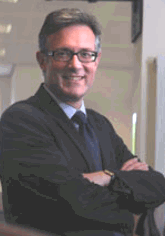|
|
|
|
|
|
|
News & Views item - October 2009 |
![]() UK's University Quality and Assurance Agency Gets a New Head.
(October 5, 2009)
UK's University Quality and Assurance Agency Gets a New Head.
(October 5, 2009)
 Anthony
McClaran, has taken over as the new chief executive of Britain's university
watchdog the Quality Assurance Agency for Higher Education (QAA). Previously Mr
McClaran headed Ucas (the Universities and Colleges Admissions Service).
Anthony
McClaran, has taken over as the new chief executive of Britain's university
watchdog the Quality Assurance Agency for Higher Education (QAA). Previously Mr
McClaran headed Ucas (the Universities and Colleges Admissions Service).
In a media release Mr McClaran said: "There is an increasing need to engage with students and to assure the public that academic standards are being maintained and enhanced. I intend to build on QAA's position as an influential voice in higher education policy and practice through working with the UK’s remarkably strong, diverse and vibrant HE institutions."
The QAA is coming to the end of its cycle of reviewing universities, which automatically triggers an internal review of its work. This will give Mr McClaran his first test to see how he deals with the review and what revisions he may make.
In an interview by the Guardian's Poly Curtis Mr McClaran said: "There's a description of the QAA in the Guardian today about its 'quiet competence'. That's been a key factor over the last five years: building up trust in what the agency does. The work the QAA does is directed towards the sector itself. But at the heart of the QAA mission is the phrase 'public interest'. Over the next few years, one of my immediate tasks is ... how can the agency engage very effectively in making sure other people – stakeholders who constitute the public interest in a way – are also hearing what we are doing?"
He went on to say there is now a consensus on the problems in higher education. "I don't accept there are widespread problems with quality across the board ... But where there are problems they were well described in the QAA's report earlier this year: they looked at the question of contact hours, expectations about contact hours, language requirements, recruitment of overseas students, [the] external examining system." Nevertheless: "I don't believe the answer to quality assurance in higher education is the setting of standards from the middle. Although I think [Parliament's] select committee report held back directly from describing that system, some of the ways it was suggesting the QAA would act in the future had a much more standardised version of higher education than I think would be healthy."
In describing the province of the QAA the new chief executive said: "A significant amount of what the QAA does is its work in the academic infrastructure, which is exactly about subject benchmarks, programme specifications, qualification framework. What it doesn't do, and where I wouldn't want it to go, is try to impose working in a model of a national curriculum for higher education. That would strike at the heart of what's one of the great strengths of the system, which is that institutions are independent, they are autonomous and they have that fundamental responsibility for what they teach. But they don't do that in a vacuum."
Mr McClaran listed two reforms he intends to undertake: 1) giving the students a greater voice -- students will be invited to sit on the panels that rate the work of their institution, and 2) "I think the dialogue with the public is an absolutely key part of what will be happening over the next few years. The QAA already publishes a huge amount on its website, but how we can communicate effectively with the public, both to show the good stuff that is there but also to address areas of concern, is going to be one of the really important tasks."
And he concluded: "The independence of the QAA is absolutely critical. It's in universities' interest. The reputation of British higher education is best served by there being seen to be an independent agency for quality."
Currently, Australia's Minister of Education, Deputy Prime Minister, Julia Gillard is visiting the United States. On her return from Washington, DC she might take the longer route home and stop off in London to have a chat with Mr McClaran about matters of university sector quality assurance.